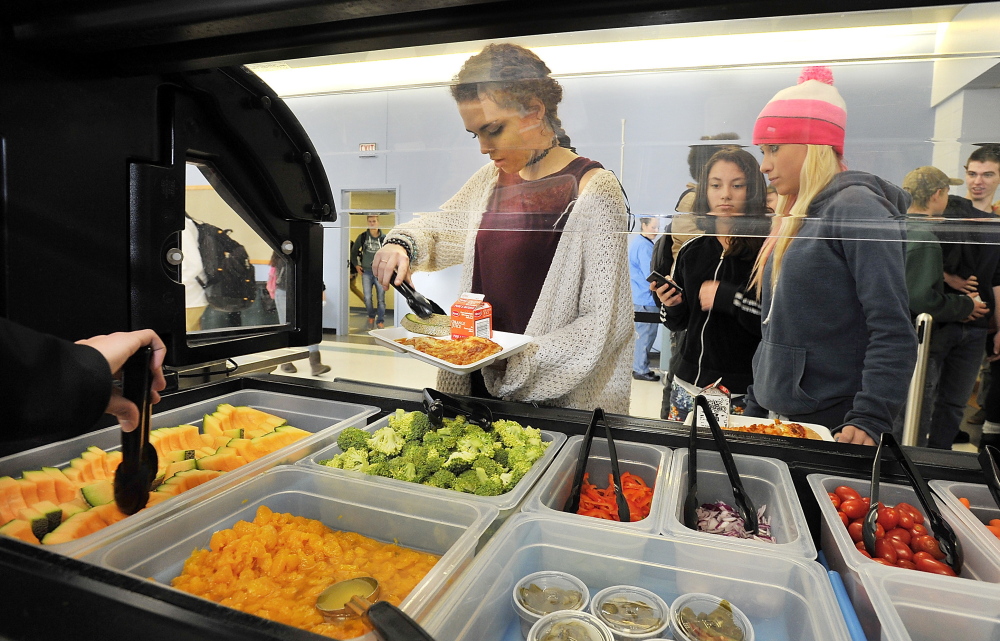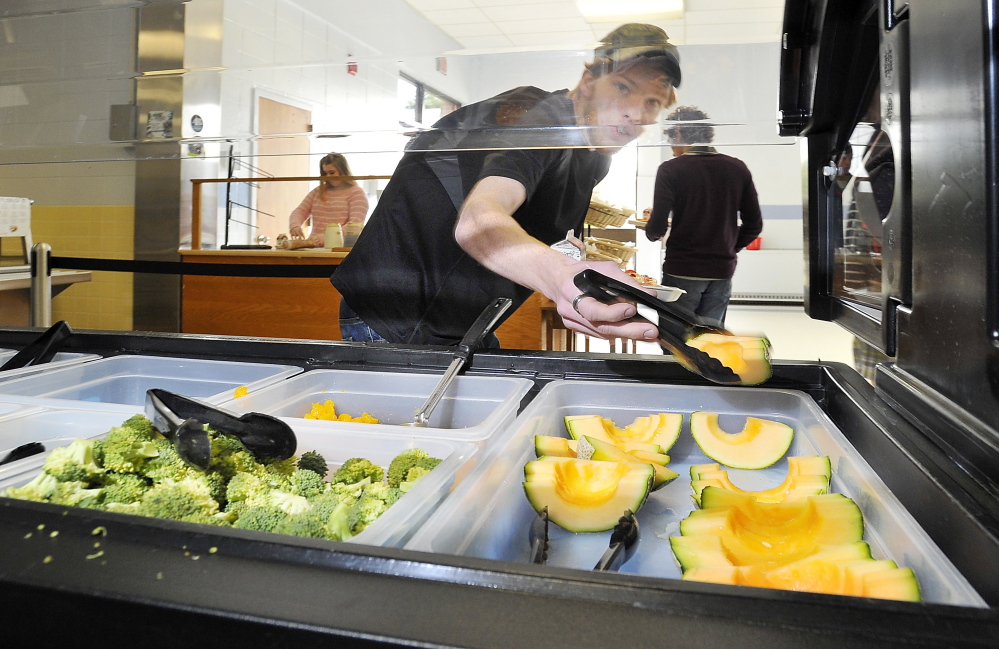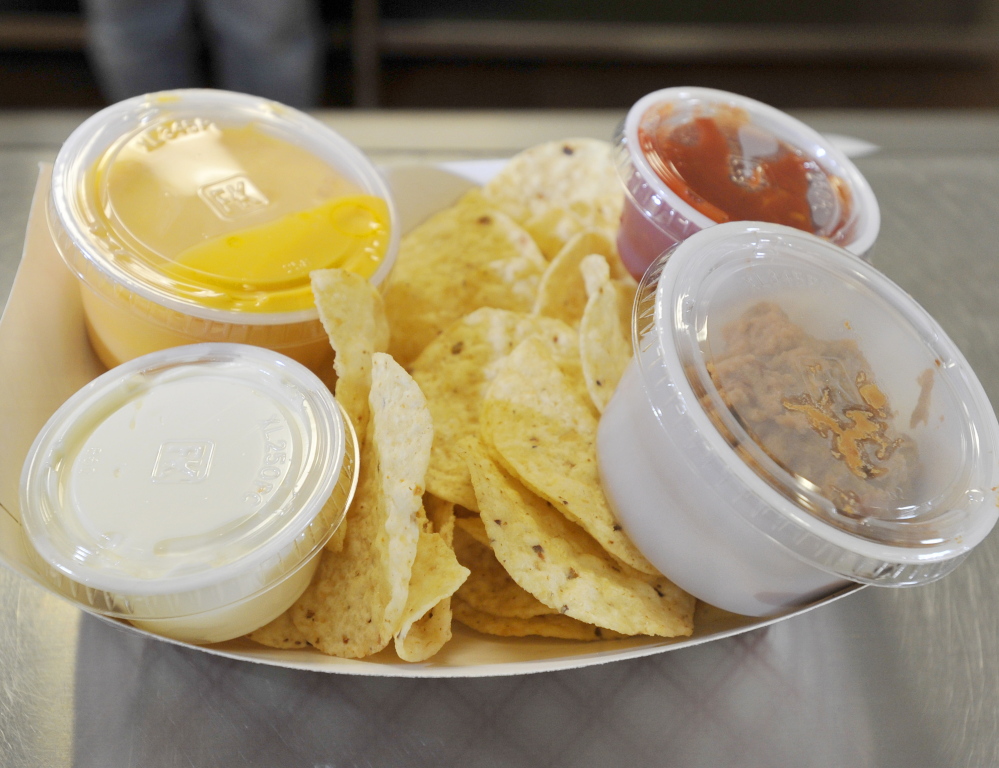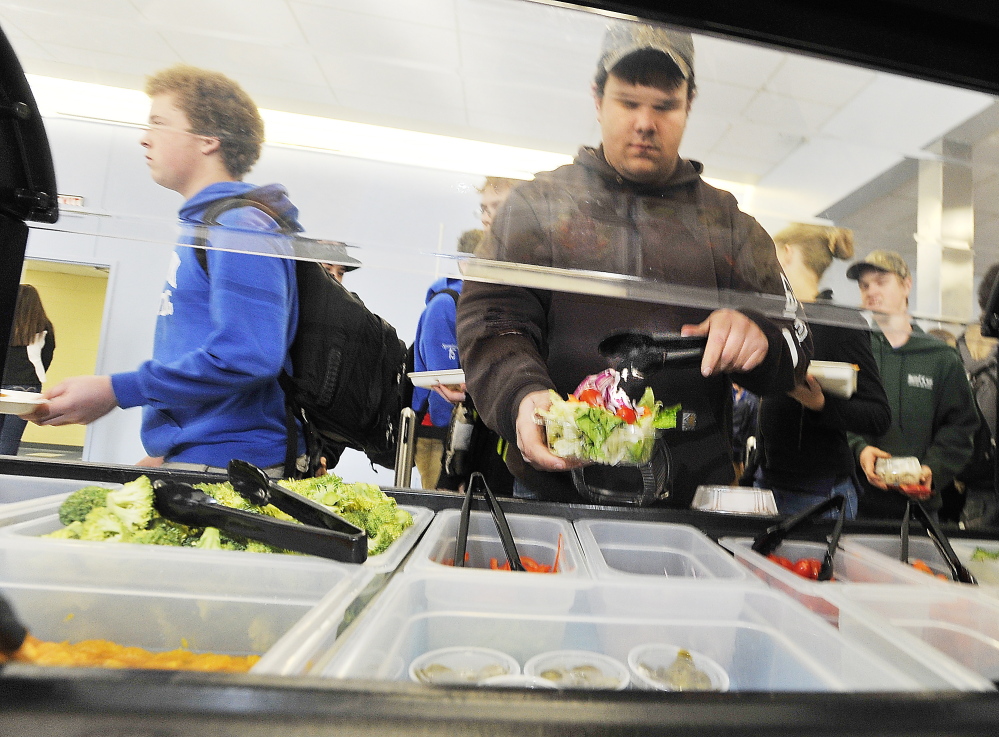Vegetarian school lunch has come a long way since the late 1980s.
That’s when the options at my rural Maine high school were limited to things like limp cheese pizza, iceberg lettuce salad and French fries. Today, vegetarian students in the Pine Tree State dine on hot lunch dishes as varied as veggie lovers’ pizza, kale salad, broccoli and pasta alfredo, Southwest penne salad, vegetable stir fry, lentil salad and vegetarian baked beans. Their salad bars teem with an ever-changing assortment of fruits, vegetables, beans, nuts and cheeses. Peanut butter and hummus have become regular cafeteria fare.
The appearance of vegetarian menu items comes as the federal government is changing its school lunch requirements, putting greater emphasize on whole grains, fruits and vegetables. At the same time, there is a growing push to return schools to scratch cooking and buying local ingredients. All these trends reflect the knowledge that well-nourished children do better academically.
In recent years, a small number of school cafeterias around the country have switched to vegetarian food only. What one of those schools has discovered may surprise meat-eaters but won’t surprise those of us who enjoy the health benefits of vegetarian eating.
At the start of 2013 an elementary school in Queens, New York, switched to an all-vegetarian cafeteria menu. Later that year, the school’s principal told the New York Daily News that since meat was taken off the menu the number of overweight children had dropped, test scores were up and students’ attention spans had lengthened.
While Maine doesn’t have any all-vegetarian public schools, it does have a growing number of schools offering daily vegetarian entrées. Daily vegan options are more rare, but schools with on-site kitchens will often make special meals for vegetarians and kids with allergies. The districts doing the most to meet the daily needs of vegetarian students tend to be located in more affluent communities and are often the ones that are also leading the pack when it comes to serving locally grown food.
DAILY VEGETARIAN
At the school district serving Kennebunk, Kennebunkport and Arundel, food service director Ellen Demmons told me she includes daily vegetarian entrées on the menus for the high school and middle school. These entrées are in addition to a number of regular vegetarian meal choices offered every day, such as a yogurt parfait, a peanut butter and jelly sandwich or a bagel with cheese. As at many school cafeterias these days, the salad bar comes with each meal.
While the district’s elementary schools don’t offer a daily vegetarian entrée, Demmons said the staff makes vegetarian and vegan entrées upon request.
“If we have a child that wants vegan and will eat that way, we make sure they have something,” she said. “We’re here to feed as many kids as we can.”
In the school district that includes Topsham, Bowdoinham, Bowdoin and Harpswell, food service director Pam Farrar also offers daily vegetarian dishes at the middle and high schools.
At the elementary schools, Farrar said, “there’s always something for a vegetarian” even if it’s not on the menu.
“We do veggie burgers or something specifically made for the vegetarians,” Farrar explained. “We do have some vegans and all kinds of people with allergies, who can’t have gluten or soy or milk. We’re always working with families to make sure there’s an option for their students.”
Demmons said the latest federal regulations make it easier for vegetarians to buy hot lunch. A 33-year veteran of school food service, Demmons said that under the old regulations, lunchroom staff found it simpler to give all students the day’s meat-based entrée, even if some of the students didn’t eat meat.
“Now vegetarians can make a salad, and we always put legumes on our salad bar,” Demmons said. “We make a white bean salad and a red bean salad. They can take their milk and a fruit and it’s a lunch.”
One of the most popular vegetarian items on the menu at Kennebunk High is South of the Border Nachos, featuring seasoned pinto beans and cheese sauce atop tortilla chips. When nachos are on the menu, the salad bar includes black bean salsa, finely shredded lettuce and tomato chunks so students can top the nachos with salad. The entrée is popular even among meat eaters, Demmons said.
BENTO BOXES
More than 3,500 kids eat hot lunch each day in Portland at the district’s 17 schools, and all of them get vegetarian choices alongside the hamburgers, chicken nuggets and Portland Pie pizza. In 2001, Longfellow Elementary School in the Deering Center neighborhood became the first city school to offer a daily vegetarian option. Just a decade later –by 2011 – all the schools (with the exception of the Cliff Island Elementary School, where the students go home for lunch) offered a daily meat-free entrée.
“This year we added the Bento Box” at the elementary schools, said Ron Adams, who heads the food service department. “It has small compartments and contains three items and two servings of protein.”
The vegetarian boxes typically feature Cabot cheddar cheese paired with another protein-rich food, such as hardboiled eggs, edamame, hummus, yogurt or roasted sunflower seeds. The box’s third compartment holds crackers, chow mein noodles or pita bread. Vegetables, fruit and milk round out the meal.
“We wanted something else that was fun,” Adams said. “The other thing we’ve done this year is to offer a Sunbutter and jelly sandwich every day.” (Portland schools don’t serve peanut butter because of concerns about peanut allergies; the district uses sunflower seed butter instead.)
Farrar said that in her district there are a few vegetarian elementary school students, but the demand for meat-free meals jumps when kids enter junior high. Many of these fledgling herbivores eventually revert to their carnivorous ways, she said, but it’s been her observation that the students who stick with it through high school have made a more serious commitment to eating vegetarian.
In recent years, a global campaign called Meatless Mondays has gathered steam. It aims to get individuals, restaurants and schools to eat and serve only vegetarian food (no meat, poultry or fish) on Mondays. More than 100 elementary, middle and high schools around the United States have officially joined the effort, but none – so far – in Maine.
Adams, with the Portland schools, says each year he “probably gets a dozen requests to do Meatless Mondays.” But the proposal presents “a number of complications,” he said, so Portland has not adopted it.
It’s the same in the coastal towns around Topsham, where food service director Farrar said, “I’m not sure if it would be highly accepted districtwide. I’m not sold on the idea yet.”
Whether any Maine schools join the Meatless Mondays effort remains to be seen, but the food service directors I spoke with all said the trend toward vegetarian eating is here to stay.
“We eat too much meat as a country for our health,” said Demmons, who eats meat herself “in moderation and small portions.” “So trying to get kids to eat more vegetables and replace meat with legumes and vegetables is one of our goals.”
Avery Yale Kamila is a freelance food writer who lives in Portland. She can be reached at:
avery.kamila@gmail.com
Twitter: AveryYaleKamila
Send questions/comments to the editors.





